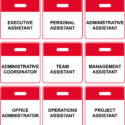
It’s not the disappearance of our roles we should anticipate, but rather the transformation of our responsibilities, explains Molly Denham
We all know the role of administrative and executive Assistants has evolved significantly over the past 50 years. While there may be global speculation of a decrease in demand for these roles in the next five years due to automation, a closer examination of our history reveals an entirely different story. There can be no doubt that the nature of our duties will shift with the continued evolution of our tasks due to automation; however, the demand for administrative assistance will persist. Instead of fearing decline, we, as a united community, need to prepare to lead an evolution of our profession. This evolution will require our community to lean into change and shape the trajectory of our own profession to better place ourselves in tomorrow’s work environment.
To understand the present and prepare for the future, it’s important to reflect on the past. Over the last five decades, administrative Assistants have played a pivotal role in shaping organizational efficiency. Initially defined by performing routine tasks such as typing, filing, and answering phones, the role expanded with advancements in technology and changes in workplace dynamics. With the advent of personal computers in the 1980s, Assistants became adept at utilizing word processors, spreadsheets, and other emerging software tools. The 1990s witnessed the rise of the internet, further transforming the nature of our responsibilities. In the 21st century, the role of administrative Assistants again expanded, and we became responsible for decision-making processes, event planning, and project management.
The historical evidence of adaptability within this field underscores our resilience in the face of change. It’s not the disappearance of our roles we should anticipate, but rather the transformation of our responsibilities, the expansion of our role in the future, and the increased strategic value we can bring to our organization. As automation takes over routine tasks, administrative Assistants will be freed to focus on higher-value activities requiring critical thinking, emotional intelligence, and strategic insight. We are at a turning point in our profession. We are long overdue an industry-wide overhaul, and we need a comprehensive review encompassing all aspects of our career to determine a path forward.
As we embark on this growth journey, the first step is to broaden our influence and create a paradigm shift in how we position ourselves within the workforce. We can then shape how we are perceived by others and better define our values. We should no longer limit our identity to being “just” Assistants. Instead, we can start by making a small step and embrace the term “administrative professional” as the standard term for our career field. This shift in terminology reflects the reality that our role extends far beyond assisting someone else or following someone else’s tasking. We are decision-makers, managers, and leaders who fill critical roles within our organization’s overall strategy. By accurately describing our multifaceted functions, we not only communicate our true value but also pave the way for a transformation in how others perceive the scope and impact of our contributions. We need to redefine our identity within the professional landscape and set the stage for a future where our role is recognized for the operational and strategic function it truly represents.
Advocating for our role as administrative professionals involves effectively communicating our contributions in today’s business environment. We need to emphasize we are not insignificant supporting actors or non-essential “luxuries.” We are a “must-have,” essential, and integral component in the success of any organization. Our decision-making abilities, managerial skills, and strategic insights make us indispensable assets in a rapidly changing business landscape. This shift can start with a single effort of changed vocabulary. Words have power, and as the traditional wordsmiths of the professional world, we should have no problem using words to better craft our message. It starts with a single change in how we name our career field and start appropriately calling ourselves Administrative Professionals.
Creating a common terminology across the entire industry is a critical step in unifying our voice. By establishing a shared vocabulary, we not only foster a sense of solidarity but also communicate our collective identity to the broader professional community. It is through this common voice we can challenge preconceived notions of the past and pave the way for the future of the administrative profession. But make no mistake, this is just a tiny step on a long road to transform our field.
This first step sets the stage for what is to come next. Updating how we name our career field may seem like a small change, but its impact will be monumental. This shift not only reflects the evolution of our roles but also signals our readiness to embrace the challenges and opportunities that lie ahead.
As we progress, it is essential to acknowledge that it is time for the real work of a comprehensive industry review to begin. Creating a 360-degree review of our field is an opportunity for us to actively participate in shaping the trajectory of our profession. The evolution of administrative professionals is not just a narrative of making a name change to adapt to technological changes but rather a story of redefining our identity within the professional landscape. By shifting from the term “Assistant” and proudly adopting the title of “Administrative Professional,” we set the stage for a future where our operational and strategic functions are recognized, valued, and integral to organizational success. Let us champion this shift in perception and pave the way for a new era in the administrative profession.
As the transformative journey toward fully embracing the elevated role of Administrative Professionals begins, it is imperative we become our own best advocates to truly effect change in how our roles are perceived. Our effort must extend beyond individual endeavors; it necessitates a unified, collective movement within the entire profession. This begins with a clear self-identity of our industry and will continue by creating rigorous and widely recognized uniform criteria of standards and proficiency, culminating in industry accreditation and education, which will provide a clear career pathway of competence and confidence.
Many inside our career field, in partnership with advocates for our profession, have already begun heralding this shift in dynamics. Our field’s evolution has begun globally. It is now time to localize the messaging and begin to work and build upon ideas and themes our profession has been trying to vocalize globally. National organizations and associations must now pick up the baton and begin to work within their sphere of influence to adapt this call for professional evolution. I propose that national organizations and associations work with their membership to create a taskforce with the mission of launching an industry-wide review of the career field within their sphere of influence.
This is no small task and will require time and energy. However, we can no longer wait for someone to magically come along and do this for us. We, as professionals, must enlist a national grassroots effort to revolutionize our role within the business community. Working with your national organizations is the best starting point. I encourage everyone to reach out to their national professional organization and ask what they are actively doing to perpetuate this career evolution. Recognize that it will take effort by many, and be willing to champion this cause and lend your assistance to make long-term change.
For now, however, the easiest thing each of us can do right this minute is change verbiage and recognize we may have the duty title of “Assistant,” but our career field is that of the Administrative Professional. I, for one, am ready to raise my hand and proclaim I want to be part of the solution… I am an Administrative Professional!













